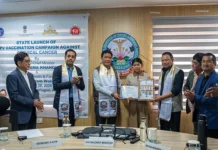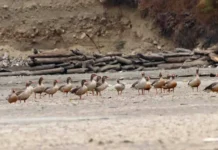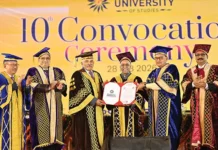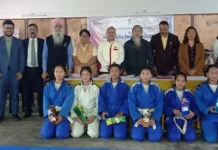[ Karyir Riba ]
ROING, 2 Apr: The Idu Mishmi Cultural and Literary Society (IMCLS) has expressed strong opposition to a media report regarding likely notification of Dibang Tiger Reserve.
In a press statement given to this daily, the apex body of the Idu-Mishmi community stated that it has been fighting against the Dibang Wildlife Sanctuary (DWLS) since its proposal stage.
IMCLS president Dr Ista Pulu and its general secretary Ere Linggi said, “We would like to remind everyone that a public interest litigation (PIL) was filed in the Itanagar permanent bench of the Gauhati High Court, and the matter was disposed of with a direction to the state government to address the issues and make a report with the help of a committee, including locals.”
“On 3 April, 2018, a fact-finding report was submitted to the Dibang Valley deputy commissioner by the committee headed by the CO, which stated that the proclamation was not disseminated to all the affected people, especially those in Etalin, Anelih and Arzoo circles, and the declaration dated 2 January, 1998 found in official record states that, after the expiry of the 8 months’ period as specified in the said proclamation, no claims and objections were received.
“However, the fact-finding committee found out many letters of claims and objections in the official record. This contradicts the statement made in the notification for the declaration of DWLS on 2 January, 1998. This raises serious concerns regarding the transparency and fairness of the decision-making process,” they said.
They further claimed that the declaration of the DWLS is unilateral, arbitrary and illegal, because they did not follow the due procedure as mentioned in the provisions of the Wildlife Protection Act, 1972 and the Land Acquisition Act, 1894.
“The government has imposed the idea of the Dibang Tiger Reserve (DTR) while the problem of the DWLS still remains unsorted. The IMCLS had earlier written to the National Tiger Conservation Authority (NTCA), objecting and stating that there shall be no tiger reserve unless the legal process of recognition, determination and settlement of the legal rights of the indigenous communities in notifying the DWLS are addressed,” they said.
They alleged that, despite the fact that the WLPA-1972 (Section 38 V) in complementary to the FRA-2006 provides cognisance of the consultation right of the gram sabha and consent of STs based on mutually agreed terms and conditions in the declaration of tiger reserve, no such consent or consultation was sought.
“After the final approval for the declaration of the DTR, the PCCF had conducted a meeting on 25 November, 2022 at Anini, but no gram sabha meeting was held, nor consent-seeking process with right holders and affected areas of the proposed DTR been held till date. The intention of the NTCA, the PCCF and the Wildlife Institute of India (WII), are clear from its desperation to support and approve the final approval for the declaration of DTR on 9 April, 2022 at Pakke,” they said.
They have also alleged that, even during the cosmetic consultation meeting of 25 November, 2022 at Anini, the language and message of the speakers were distorted in the minutes of the meeting when several practical questions and issues were raised regarding the feasibility of tiger reserves in higher elevation.
“A written objection against the said distorted minutes of meeting has been placed before the DA, Anini (dated 3 March, 2023). Several resolutions passed by the villagers objecting to the tiger reserve have been submitted to the PCCF. The government cannot impose on us; while not following the due procedure, they cannot bypass the law,” they said.
“The Namdapha Tiger Reserve (NTR) was declared in 1983, and as of now there is hardly any tiger in the NTR. What was the NTCA conserving all these 40 years? Where is the fund gone? Can the NTCA justify the amount of expenditure incurred for protecting the tigers in NTR and still coming out with hardly any tiger population there? What were they expecting? Can the chief wildlife warden answer these questions? Why do we need to conserve the tigers in our Mishmi land when it is conserved naturally through our beliefs and cultural practices that strongly forbids the hunting of tigers?” they questioned, and added, “It is scientifically known that several cultural taboos have their unique role in the conservation of wildlife. This is also the reason why many tigers and the Idu-Mishmi community have coexisted in a harmonious and cohesive way since time immemorial, and the same has been published. We also did not kill any tigers in the past, despite knowing that they have preyed on livestock in Dibang Valley (for instance in Brango village) which is also known to the DA, Anini.”
They opined that such conservation is reasonable in plains of urban areas where every perimeter of forest has seen intrusion of unbalanced development. “This haste in trying to declare the DTR – is it because few officials want their ACR to be placed in good record and claim that it was declared under so and so tenure?” they questioned.
They also questioned the timing of the recent statements in the electronic media, referring to a report titled ‘Tiger poacher red-handedly caught with tiger skin, body parts and weapons, arrested accused in Dibang Wildlife Sanctuary, Anini’.
They said, “This report, which was aired on 27 February, 2023 at 9:24 am, used the words ‘with support of the local poacher’. Again, there was this post using the words ‘the tiger was actually poached from Malinye area’. Then there was the media statement by the PCCF on 1 March, 2023, given to another media body, using the words ‘local poacher’. These were all subtle attempts to directly or indirectly malign the entire Idu-Mishmi community as tiger killers, and to discredit its cultural way of wildlife conservation.”
They informed, “It may be noted that neither the police nor any investigating agency has so far produced any conclusive evidence beyond a reasonable doubt to state that the indigenous inhabitants of Dibang Valley were specifically involved in any manner for such an alleged offence whatsoever. Several FIRs (dated 2 March, 2023), a complaint letter to DFO (dated 2 March, 2023) in Anini and FIRs in Roing (dated 7 March, 2023 and 17 March, 2023) have been lodged by indigenous inhabitants of Dibang Valley and Lower Dibang Valley districts, respectively, against alleged offenders. It is also learnt that FIR lodged vide dated 7 and 17 March, 2023, that a person named Taga Mapikam from Chaglagam, Anjaw, who is allegedly absconding and whose vehicle bearing registration number AS-23V 2160 was allegedly used by one Jakir Hussain, an accused arrested by the Wildlife Crime Control Bureau (WCCB), sub-regional officer Guwahati, and forest department of Arunachal Pradesh, and Sankhrolum Bellai of Mithumna, Anjaw, and Kaling Lego of Pasighat are not indigenous inhabitants of Dibang Valley district. It is relevant to understand that the term ‘local poacher’ is a case of clever drafting to confuse the entire public to malign the people of a particular district and community.
“However, it could also mean any APST, not necessarily an indigenous inhabitant of DV and LDV. Therefore, concern local media of Arunachal Pradesh and desperate PCCF officials of the state and WCCB should have carefully applied their minds to distinguish the ‘local poacher’ rather than resorting to naming and shaming tactics to malign the entire people of a particular district whatsoever,” they said.
The IMCLS has earnestly requested the authorities concerned to conduct a thorough and impartial investigation into the matter and take appropriate action to address the concerns raised by the local communities. They have also urged the media to present a fair and unbiased view of the situation and not ignore or downplay the grievances of the indigenous people.
They added, “We urge the concern authorities to take into account the objections raised by the local communities and to ensure that their voices are heard before making any decisions regarding the DWLS. We also call upon the media to present a fair and balanced view of the situation and to refrain from publishing articles that are one sided and biased.”
Conclusively, the IMCLS said, “We the Idu-Mishmi community, have deep faith in our cultural ethos that emphasises the protection of natural resources and its wildlife, but it should not be done at the cost of the lives and livelihoods of the local community. We strongly demand the authorities to work towards finding a solution that benefits everyone and respects the rights of the indigenous people. Otherwise we will be forced to resort to other democratic means, for which the NTCR and the state government should also be held responsible in future.”





